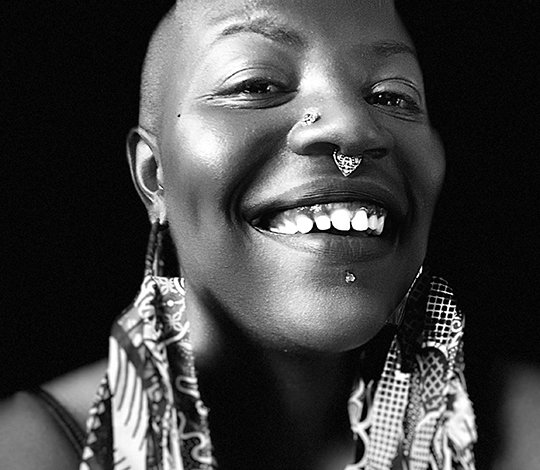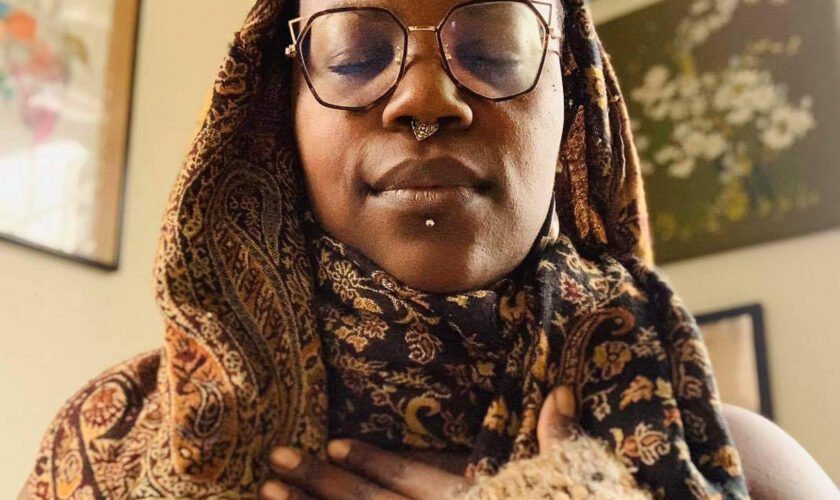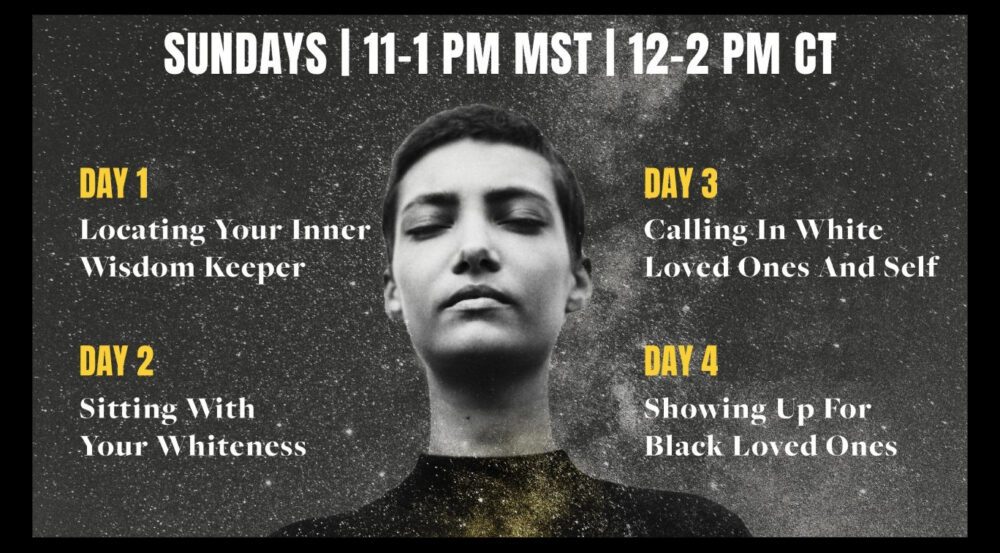Well-meaning, humbled, “ready to serve” white people.
They are so newly visible since the May 26 murder of George Floyd, says Goddess Carroll, a specialist in massage and energy healing. And that visibility is imperative, says Carroll.
But for Black people like Carroll, well-meaning whites asking “how can I help?” can be exhausting, trigger trauma repeatedly, and perpetuate a generations-old cycle of expecting Black people to do the hard labor. For illustration, Carroll offers the analogy of an abused child.
“Say, you were abused from age 1 to age 18, and you’re now age 19, and your parents come and say, ‘I don’t know what to do, I’m sorry; how can I support you?’ How can you even respond?
“As people who have been abused for 400-plus years, how do we now come to the person who’s abused us and tell them how to help us? White people are asking us to do the work of showing THEM their humanity. That just should never have been our job.”
And yet, that’s essentially what Carroll is trying to do with a four-part online workshop series they are currently presenting. Carroll is committed to using mind/body and spiritual healing to overcome mental, physical and emotional trauma caused by “whiteness,” and leads an online healing platform called Sun Seed Community.
Their series on the “Inner Wisdom Keeper” is specifically for helping white people take responsibility for their own healing from racism, and then learn how to “be there” for their Black friends, co-workers and family members. Though receiving new focus since Floyd’s death, Carroll’s workshop first started after Ahmaud Arbery’s murder in February.
Carroll says their work is also a way to clarify that focusing only on Floyd’s murder — or on the dozens of other police murders of Black men — is yet another form of oppression. While high-profile videos of Black men being murdered are usually at the heart of protest movements (i.e., Rodney King and George Floyd and dozens in between), Carroll says the dehumanization and disconnect of systemic racism goes deeper.
Black women actually experience much more violence, more often, than Black men, Carroll says. And the ongoing murders of Black transgender people still have not triggered much united public outrage. Focusing on the Floyd video in isolation, and escalating it as a pinnacle of oppression, is hurtful, Carroll says.

Carroll aims to help white primarily cis-gendered people grasp all of this, and then empower them to understand, identify, and confront systemic racism without overburdening Black people.
The workshop provides a four-step process, built around a combination of mind/body awareness and spirituality:
• To start, Carroll uses their background in massage therapy to help their students identify what feeling “safe,” “loved,” and “held” actually feels like in one’s body. They call it “listening to what our bodies are trying to tell us.”
• Next, Carroll guides the group in “hearing our ancestors’ stories.” They ask group members to openly discuss some of the family narratives passed down for generations. Carroll offers their own family’s example, of a tale long told about their great-great-great-grandmother and how she defiantly “stole” some of the peas she was harvesting. When her “master” found out, he beat her so forcefully she vomited the vegetables.
Their family often tells the story with laughter, but Carroll no longer does.”It’s supposed to honor strong women in my family, but when we start to unpack that story, that is traumatic,” Carroll says. Coming to grips with the real meaning of glorified family narratives, rather than how we’ve been conditioned to see them, is one part of the healing they help white people find, Carroll says.
• The third step is unpacking the real impact of life narratives, especially in relation to racism or “anti-Blackness.” Carroll asks their workshop students to confront how their misguided narratives affect how they function in the world. “I know that as a Black person, I carry a lot of anti-Blackness,” Carroll says. “And I learned to do that from a white culture. So if I’m carrying that as a Black person, how much is a white person carrying that? Because it actually benefits them; it really hasn’t benefited me, and yet I carry it.”
Carroll helps non-Black people understand how to “recenter.” “It’s about not going back to a trauma response,” they say. “I ask them, ‘do you go to a place of defense, or can you sit back and truly listen?’ “
• The final step is how to truly be “there” for your Black friends. It can be a difficult balance, Carroll says. Especially because many Black people are long ago wearied and traumatized by all the deaths. “We’re exhausted,” Carroll says. “By the questions… by having to ‘baby’ a white loved one… but also, we are still figuring out what we want from our white loved ones. Because honestly, it really hasn’t been asked of us until now.”

Carroll says they are making it clear that this workshop is specifically for non-Black people. “Our processing of what’s going on right now is so different than non-Black folks’ processing. The ancestral trauma, the way in which our own lives have held trauma, of being Black in a white-dominated society…. it’s something we shouldn’t have to, and can’t, fully process among the perpetrators of that, and that’s white folks.”
The other key quality of Carroll’s workshop: it is presented in the context of their overall identity, which is not only Black but also queer and nonbinary, and a practicing solitary witch, meaning one who practices their faith in privacy rather than with an organized group. This leads to a broadly informed approach:
• Carroll understands through first-person experience the damage of a fundamentalist religious upbringing for queer people. They were raised as a Jehovah’s Witness and had been told, growing up, that both queerness and any spirituality outside of that faith was disgusting, sinful, hurtful and dangerous. Carroll said finding their true spirituality has helped them understand, “that the thing I was taught to fear was myself. And that there is so much more love and recognition of self that exists.”
• Carroll also understands first-hand the challenges of being a Black gender non-confirming person today. The youngest of four “assigned female at birth” siblings, Carroll was raised as a woman and first realized they were nonbinary just under three years ago. “Finally, I am utilizing my voice to speak from a place of truth-telling.”
• Carroll grew up in Iowa, but lived for several years in Colorado, giving them two drastically different views of how “whiteness” is experienced by a Black person. In Colorado, they said, “there’s this idea of ‘come one, come all.’ But when you start to unpack that, you see there are still vast disparities between People of Color and white folks. And if you venture outside of certain areas as a Black person, your life is still in danger. Confederate flags are still there. It’s an illusion.”
In addition, Carroll said, Coloradans had a greater tendency to “exotify” them and other People of Color, while in Iowa, Carroll felt more disregarded. “In Colorado, I was exotic and interesting and very ‘other’ in a different kind of way, put up on a pedestal. That also really distanced me from community in other ways. Coming back to Iowa and being ignored again, I walk down the street and people just avert their eyes.”
Carroll wants those who sign up for their workshop to be ready for a healing journey that will also be uncomfortable, and will challenge them to “show up fully.”
“You have to start with yourself,” they said. “If, knowing that, you feel like ‘I want to do this,’ you will be held in that space. But you will also be held accountable. We all are. That’s part of this loving work.”
Carroll welcomes people to join the series, even if they’ve missed the first two or three sessions. They also offer the full four-part workshop as a package.
Click here to register for Carroll’s workshop, which is noon to 2 p.m. CST (11 a.m. to 1 p.m. MST) and presented in collaboration with the Be Free Healing Center in Fort Collins, Colo. You can also contact Carroll directly at sunseedcommunity@gmail.com to book their workshop for your own group. To support Carroll’s work overall, see their GoFundMe page here.


